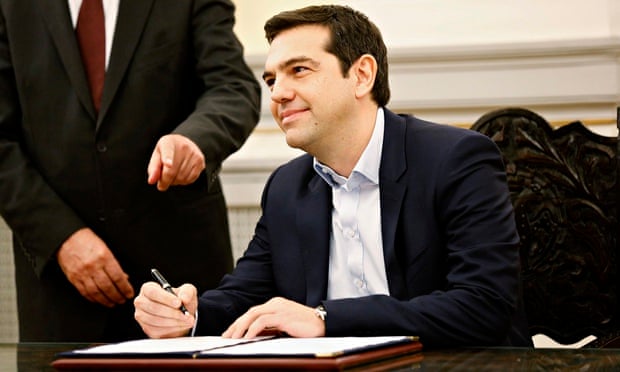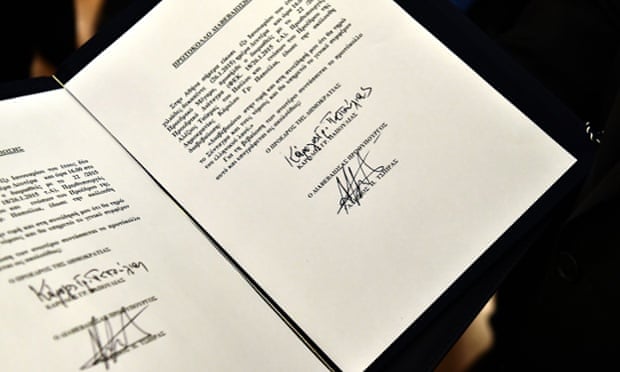Helena Smith in Athens, Julian Borger in Brussels and Katie Allen in London Tuesday 27 January 2015
Syriza leader Alexis Tsipras heads coalition of left and right parties with mandate to take on country’s paymasters

Alexis Tsipras, Greece’s new prime minister, says he will not wear a necktie until his country’s bailout terms are renegotiated. Photograph: Yannis Behrakis/Reuters
Greek radicals sought on Monday to redraw the political map of Europe, forming a coalition government of left and right, united only by their desire to defy the European financial establishment and shrug off the constraints of austerity.
The coalition, led by 40-year-old Alexis Tsipras, was expected to dispatch its new finance minister to Brussels in the next few days to seek a fundamental renegotiation of Greece’s economic bailout package, vowing that “the end of humiliation has come”. Tsipras and his Syriza party have promised to replace the austerity programmes imposed by Greece’s international creditors with policies aimed at helping the third of the population now living in poverty.
Finance ministers from the Eurozone, meeting at EU headquarters, responded cautiously, acknowledging the new political realities in Greece and offering to negotiate, while ruling out the straight debt write-off Tsipras is demanding.
A spokesman for the German government, which would have to approve and largely finance any new debt relief, said its position was unchanged by the Greek election.
The future of the Eurozone will be at stake in the tough negotiations to come.
The radical backlash to austerity embodied by Syriza’s electoral triumph immediately showed signs of spreading on Monday. Spain is due to hold elections later this year, and the country’s counterpart to Syriza, Podemos, is surging in opinion polls. Its leader, Pablo Iglesias, told an ebullient rally in Valencia: “Hope is coming, fear is fleeing. Syriza, Podemos, we will win.”
The inauguration of Tsipras, the youngest prime minister in Greek history, was laden with the symbolism of change. He broke with tradition by taking a civil oath of office rather than a religious vow before the nation’s spiritual leader, Archbishop Ieronymos. Tsipras appeared in an open-necked shirt, having vowed not to wear a tie until he has negotiated Greece a new deal in Europe.
His first act as prime minister was to lay roses at a memorial to 200 Greek communists executed by the Nazis in May 1944. Analysts said the gesture left little room for interpretation: for a nation so humiliated after five years of wrenching austerity-driven recession, it was aimed, squarely, at signalling that it was now ready to stand up to Europe’s paymaster, Germany.
Syriza’s margin of victory went far beyond expectations, winning 36% of the vote but falling just two seats short of an overall majority in parliament. After a brief round of consultations, Tsipras turned the political order upside down by partnering with the right-wing party Independent Greeks (known by its Greek acronym ANEL), notable for its xenophobia, anti-Semitism and homophobia, which won just under 5% of the vote.
ANEL's leader, Panos Kammenos, singled out Jews for not paying taxes. He has also loudly drawn a historical parallel between austerity and wartime occupation that Tsipras left unspoken with Monday’s visit to the war memorial. Kammenos has described Europe as being governed by “German neo-Nazis”.
Podemos party secretary general Pablo Iglesias, who suggested Syriza victory could be repeated in Spain. Photograph: Andrea Comas/Reuters
Tsipras’s choice of coalition partners came as an unpleasant surprise to the Eurozone's finance ministers gathering under wet, leaden skies in Brussels. One after the other, they insisted the new Greek coalition would face the same rules and conditions as its predecessors.
The German government, in particular, emphasised continuity. The finance minister, Wolfgang Schäuble, said the new government would have to abide by the bailout agreements Greece had signed.
But the finance ministers also made clear there was room for negotiation. Pierre Moscovici, the European commissioner for economics and finance, said the EU recognised “the clarity and legitimacy of the new Greek government” and claimed: “We all want a Greece that stays on its feet, creating jobs and growth, reducing inequality, and a Greece that repays its debt.”
Jeroen Dijsselbloem, the Dutch president of the euro group, said there was no political support for a write-off of Greek debt but added that “if necessary” the euro group could have another look at the sustainability of Greece’s debt, after the completion of a review of the country’s current financial situation.
Dijsselbloem said he had had a 15-minute phone conversation with the new Greek finance minister, who he did not name but who had been widely expected to be a Syriza economist, Yanis Varoufakis.
Dijsselbloem said he had expressed willingness to work together with the coalition, adding that the new Greek minister had been “very adamant” his country would stay in the Eurozone. Although no details were discussed in the initial conversation, the Dutch euro group leader said it had been a good start.
“What I will not do is negotiate through the press and I hope they will not either,” Dijsselbloem said. “The problems in the Greek economy have not been solved overnight with this election. They are still there.”
The document swearing in Greece’s new prime minister Alexis Tsipras Photograph: Aris Messinis/AFP/Getty Images
Speaking in Athens, Varoufakis sought to downplay concerns triggered by the party’s choice of coalition partners that the new government would take an overly aggressive stance in negotiations.
Varoufakis said the government would seek to persuade its Eurozone partners to allow the country to reduce its debt burden by linking repayments to growth. He also dismissed suggestions that Syriza would threaten a “Grexit”, a Greek departure from the Eurozone. “We, who happen to be in the Eurozone, must be very careful not to toy with loose and fast talk about Grexit or fragmentation,” he told BBC radio.
“Grexit is not on the cards; we are not going to Brussels and to Frankfurt and to Berlin in confrontational style. There is plenty of room for mutual gains and benefits.”
Market reaction to the election result was muted. Syriza’s decisive victory initially caused the euro, already under pressure from the European Central Bank’s latest stimulus package, fall to an 11-year low against the dollar. But it recovered during later trading and, by the time Tsipras was sworn, in the euro was up on the day against the dollar at about $1.124.
“The Greek election results were no surprise and were largely priced into markets,” said Jasper Lawler, market analyst at the broker CMC Markets UK.
“The true impact of the victory of Syriza will be hard to ascertain until there is more news on the renegotiation of the bailout terms between Greece and the troika.”
Mujtaba Rahman, an analyst at Eurasia Group political risk consultants, said that with his partnership with ANEL rather than the moderate party Potami (the River), Tsipras was “signalling he is prioritising internal over external constraints. He has formed a coalition he can sell to the hard left in Syriza even if it makes it tougher to negotiate a new deal on Greek debt.”
Poster reads ‘That’s a really good night Frau Merkel’, in a sign of how many feel about ‘paymaster’ Germany. Photograph: Michael Debets/Pacific Press/BI
Rahman argued the room for manoeuvre for the German chancellor, Angela Merkel, had narrowed as a result of last week’s quantitative easing decision by Mario Draghi, the head of the European Central Bank, pumping more than €1tn into financial markets.
That decision was taken despite opposition from Merkel and German institutions, who saw it as a financial bailout to free-spending Eurozone governments. “Quantitative easing is a big problem for Merkel, as it has mobilised constituencies which opposed it in a vocal way,” Rahman said. As a result, the room for negotiation has narrowed from both sides.
“The probability of Greek exit from the Eurozone has to increase,” he concluded, but he still believes it is more likely that an 11th-hour compromise can be found in the remaining months before Greece has to be repay a nearly €7bn loan to the European Central Bank in June. That is the really hard deadline that the negotiators are facing.
![The [Greek] European Tragedy](https://blogger.googleusercontent.com/img/b/R29vZ2xl/AVvXsEiWKI5s90SFm1wWTk6bs4p7CgslaC2SnYPsrZhb-B-smOufNNCSxCvpBLI9hOB-LsXZjir_PNmEiMk2-E62F3xkg96IoC6QFAaZAnPRTVH340IN9WBRmWJqPkjWlgyRj3zpALp7h6hvA58/s920/GkBack_new.jpg)


